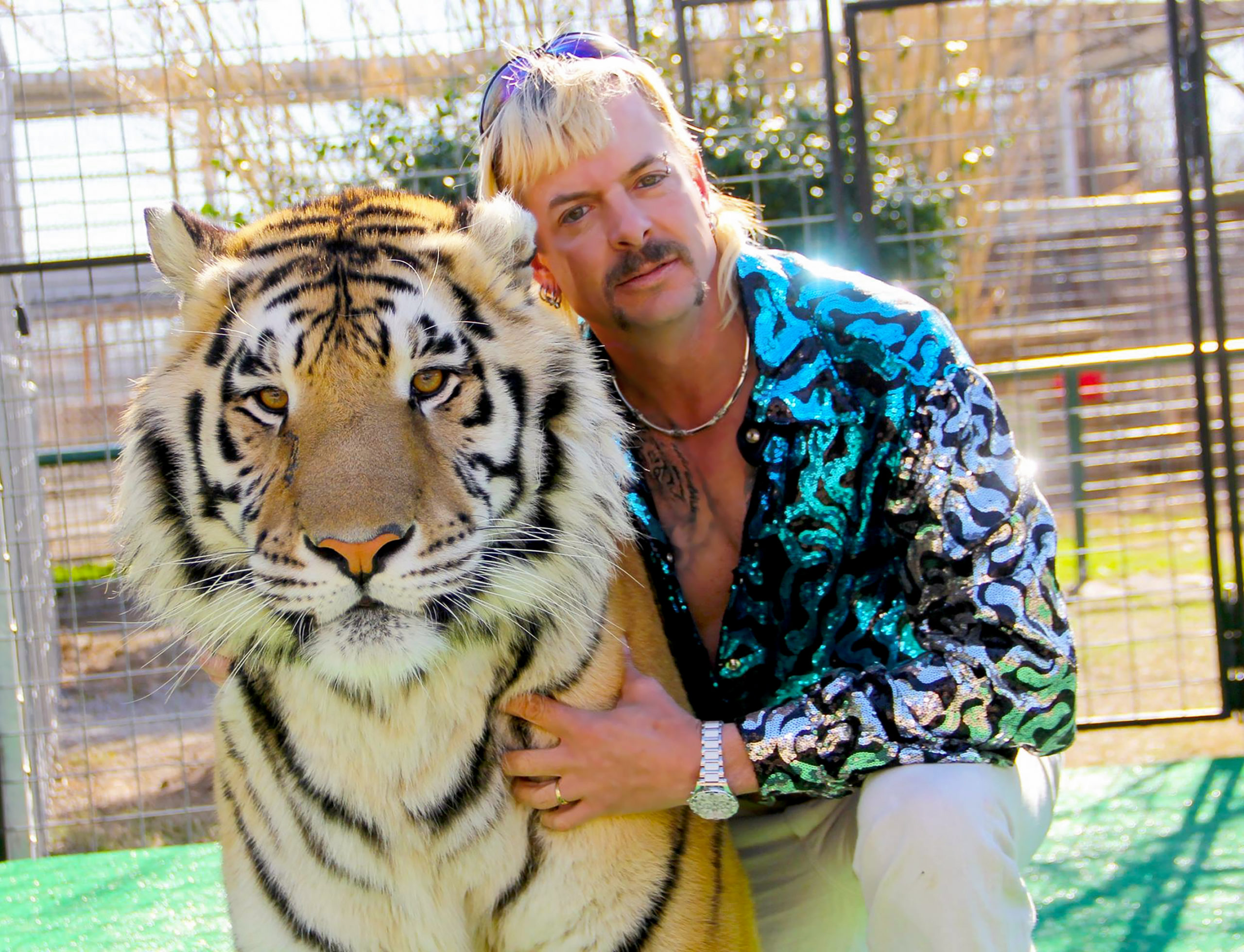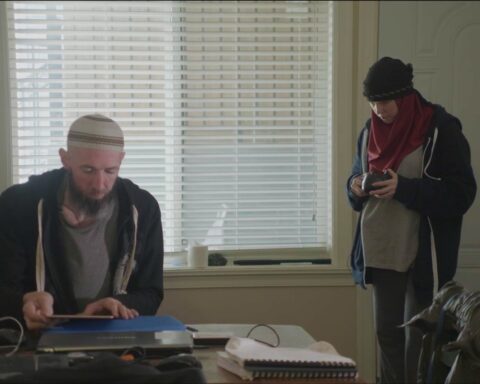Please note that this article includes spoilers. Reader beware if you haven’t watched the series.
Behold the sensation that is Tiger King: Murder, Mayhem, and Madness, Netflix’s docu-series that seems to collapse under the weight of its own collection of insanity. For those of you who don’t know (and I’m sorry both of you haven’t had a chance to find out), the series presents the story of Joe Exotic, a collector of wild animals—tigers, bears, lions—who runs a zoo, where the public pays to see the creatures up close. We meet a number of his fellow exotic-animal enthusiast colleagues and enemies along the way, including Carole Baskin, with whom he has had a longstanding rivalry. Filmmakers Eric Goode and Rebecca Chaiklin knew they’d found a goldmine when they started shooting the series several years ago. As one character says early in the first episode, “These people are fucking insane, man.”
And insane the series is. There’s a trans man who loses an arm to a tiger, but who remains forgiving of Joe Exotic (despite what is clearly negligence). There’s polygamy, both gay and straight. There’s meth addiction. There are suspicions and spoken allegations of murder and attempted murder. And there’s even the Cuban-American who inspired the protagonist in Brian DePalma’s Scarface.

Co-directors Goode and Chaiklin know to keep these striking characters and stunning plot points flying at you at light speed. The WTF factor kicks in and won’t let up. Before you can recover, another plot point is introduced, or another crazy character. Joe Exotic begins singing in one of his videos, which you can see in YouTube. The show was declared the first bit of pandemic porn, since it coincidentally arrived just as everyone was being asked to stay in their homes to flatten the Covid-19 curve. The off-screen shenanigans were also as much fun to observe: Facebook and Instagram fan pages were created, Rob Lowe dressed up as Exotic in what was a clear audition for the inevitable dramatic version of the story, and—perhaps most surreal of all—OJ Simpson chimed in via twitter, to suggest he knew Carole Baskin was guilty of murdering her husband.
Some have argued the show doesn’t address a crucial issue, and that is of the obvious and epic cruelty of the treatment of these wild animals. But this strikes me as a really odd argument, given that it seemed quite obvious throughout the series that the filmmakers were careful to point to the clear abuse the animals were suffering, and insinuations of even worse cases. Further, one of the takeaways from the show is that the characters purporting to love the animals are really just narcissists, and have little concern for the felines (and various other species) depicted in the show. The hope would be that Tiger King’s influence might lead to some changes in regulating how these animals are kept, treated and bred.
There were many things that struck me as odd about the series. While it feels novel, I couldn’t help but consider some landmark documentaries as the show progressed. Some have argued that Baskin is treated in a misogynist manner by the filmmakers, but it’s hard to pin the blame on them. Joe Exotic says so many horrible things about her as he is filmed—promising that he intends to kill her—that one can safely say it’s his issue, not the filmmakers. Baskin seemed eerily familiar as she looked into the camera, discussing her feud with Exotic, chuckling and smiling as she talked about life-and-death issues. It struck me how much she reminded me of Little Edie, one of the protagonists in the Maysles brothers’ Grey Gardens (1975), the landmark doc that polarized audiences and critics around its frank depiction of a mother and daughter, locked down in their collapsing mansion in the Hamptons. Aside from the physical and behavioural similarities, the ethical questions that arose in that film (“Should the Maysles even be filming this?” some asked at the time) hit home again here too. There is clearly a potent classism that runs through Tiger King, since for lack of a better term, these are white trash yahoos, to use terminology that I’m not supposed to be using anymore. One of Exotic’s husbands only has a few teeth left, and explains that the reason is his extensive meth use, which also impacted his brain (he says this while pointing to his head). It’s really tragic. (Notably, this fellow subsequently had his teeth fixed, but the filmmakers only chose to use the footage of him with the teeth missing.)
Photographers and documentarians have come under fire for creating poverty porn, that is, the depiction of people who are economic basket cases, seen through the lens of middle class or upper middle-class filmmakers. The counter-arguments have also been longstanding, in particular the defenses of Diane Arbus, the legendary controversial photographer who captured those who had previously been marginalized—transvestites, drug addicts, circus performers—in unapologetic portraits. It is a bit of a stretch to liken Tiger King to Arbus (I’m anticipating the eye rolls as I type this). The show has a lot more to do with Jerry Springer than even a great maverick photographer.
Some of these ethical arguments seem almost quaint now. In a media universe saturated with Reality TV, DIY YouTube channels and TikTok videos, everyone, it seems, has their own platform and can put on their own show. But given the extreme narcissism of Joe Exotic, one has to wonder about feeding this particular beast. Exotic arranges for every aspect of his life to be filmed; perhaps the most unsettling, cringe-worthy moments occur during the funeral of hubby #2, who appears to have shot himself (the reaction of someone who actually witnesses the gun shot is captured and is included). Exotic tries to make sexual jokes about his late husband, and it becomes clear the eulogy isn’t an ode to his late lover (who we learn was heterosexual but married Exotic for the meth and tigers) but rather about himself.
Some have pondered why Tiger King is such a hit right now. This seems the most obvious of questions. The seven-part show leaves you with the sense of being overwhelmed by venality: the moral vacuum, the epic vulgarity, the disregard for human and animal life, the downright stupidity, the nastiness. Is it any wonder the show resonates during the Trump era? The President’s daily press briefings about the global health crisis, are more about an excuse for him to talk about himself, a strategy Exotic no doubt admires. And the animals in cages evoked memories of children of asylum seekers, separated from their parents and placed in cages—a scandal that now seems all but forgotten. Exotic even made runs for both governor and president, the campaigns serving as additional comic plot points in the series. Connections between the show and the Trump circus have emerged online, with one meme featuring a doctored photo of Exotic as Trump and Baskin as Hillary Clinton. Not surprisingly, Exotic, now serving a 22-year sentence, has floated the idea that Trump might pardon him.
Thus Tiger King is the perfect series for our times. A show about narcissists with no sense of self-awareness, rampant cruelty masquerading as morality and law and order, all soaking in a philosophy that is decidedly anti-humanist. It’s uncomfortable to watch precisely because it is so incredibly accurate.












